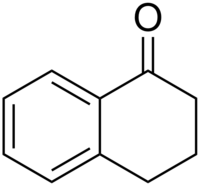
Photo from wikipedia
Oxidative coupling of naphthols is a useful method for the formation of new carbon-carbon bonds in organic synthesis. In the presence of hydrogen peroxide, platinum supported on activated carbon catalyses… Click to show full abstract
Oxidative coupling of naphthols is a useful method for the formation of new carbon-carbon bonds in organic synthesis. In the presence of hydrogen peroxide, platinum supported on activated carbon catalyses this reaction. The outcome is influenced by the solvent, the reaction temperature and the physical structure of the catalyst. The catalyst structure is determined by the synthesis method and the modifier used (Bi or Sb). Within 40 min 4-methoxy-1-naphthol can be converted to 4,4'-dimethoxy-2,2'-binaphthalenyl-1,1'-diol with a yield of up to 94%, or to 4,4'-dimethoxy-2,2'-binaphthalenylidene-1,1'-dione with a yield of 92%. High amounts of quinoid byproducts (≤22%) are observed in nitromethane as the solvent.
Journal Title: Kinetics and Catalysis
Year Published: 2017
Link to full text (if available)
Share on Social Media: Sign Up to like & get
recommendations!